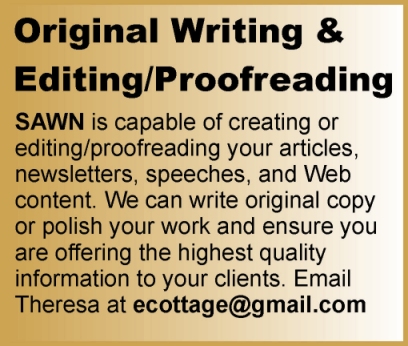Effective business writing in the workplace is essential. It is imperative that all written work be accurate and concise whether it’s a simple office memo, sales letter, brochure, or daily correspondence. Bear in mind that clients and prospects measure your company’s professionalism by the quality of your marketing material. Nothing can kill your credibility faster than content with grammatical and punctuation errors.
Associations and Organizations recognize that effective writing is crucial to their successful business communications. Basic reasons for Business to Business (B2B) and Business to Customer (B2C) marketing communication are:
- to inform (tell someone about something)
- to instruct (get someone to do something)
- to influence (persuade someone to do something)
- to interpret (reply to their communication) and
- to interest (get someone interested in you and your project).
SAWN can produce material written in clear English, making it accessible and understandable to the recipient. Examples of B2B and B2C material include web content, brochures, print-based and electronic newsletters. We take the project from conception (research, copy writing, graphic design, layout) to final production (editing, proofreading), and deliver on deadline.
Do you need well-written copy for any of the following?
- Advertorials
- Articles
- Booklets
- Brochures
- Case Study
- Flyers
- Newsletter (in-house & external)
- Manuals
- Pamphlets
- Presentations
- Press Releases
- Proposals
- Reports
Knowing the general likes and dislikes of your target audience is the highest law in business copy writing. To truly connect with a diverse readership that may include management, stakeholders, employees and customers, as well as competitors and the media, it is important to take into account your audiences’ understanding of the subject and in providing material that has true value. Since business writing contains messages of persuasion and motivation, and values and biases that appeal to your readership’s current perception it builds credibility and brand loyalty; however, the objective of business or marketing literature is to introduce audiences to new concepts, technologies, products and services.
Contact Theresa (ecottage@gmail.com) to create a professional, helpful, friendly and efficient company image through your advertorials, flyers and press releases.
Write a Business Book
You may have a great entrepreneurial story you want to publish, telling readers how you got to where you are today, the pitfalls and successes experienced along the way and your advice for emerging entrepreneurs. You could be the next Charles Handy, Tom Peters or Guy Kawasaki—traveling the world, running workshops or giving talks about your expertise. Just as entrepreneurs change the face of business, social entrepreneurs act as change agents for society, seizing opportunities to invent new approaches, and create circumstances that will allow people to achieve their full potential. While a business entrepreneur might create entirely new industries, a social entrepreneur develops innovative solutions to social problems and then implements them on a large scale. Social entrepreneurs are individuals with resourceful solutions to society’s most pressing problems; their objective is to give people the proper tools and skills to improve their lives.
Getting your book published is incredibly gratifying — but how do you know for sure if your topic is interesting enough for others to read? Do you have a different perspective on a business model? Technology has changed the way modern business operates. Keeping abreast of latest trends is essential for any business venture; people rely on books to bring them up to speed on new business and technology developments. Topics that spring to mind include Crowdsourcing, Search Engine Optimization (SEO), Transmedia Storytelling, and LinkedIn.
Do you need a Case Study (explanatory analysis) of a person, group or event?
There are two types of case studies, namely
- factual ones depicting real organizations, people, and situations and
- fictional ones that, although usually based loosely on actual people and events, do not use real organization’s or people’s names.
Factual Case Studies: The advantages of factual case studies are that they can provide a wealth of detail, give credibility to situations and problems, and, most important, provide real outcomes and actual results to facilitate real-world solutions. Although factual cases furnish concrete, not theoretical, solutions, they also have some drawbacks. Often students or case discussants get hung up debating the details of the case as they may remember them. Some discussants claim inside information or refer to later outcomes that bring the organization’s solutions into question. When discussing factual cases, analysts tend to focus on the accuracy of the details rather than on the appropriateness of the solutions. The most effectual use of factual cases are for describing current organizational problems, then analyzing and attempting to solve the problems using a consultative approach.
Fictional Case Studies: Fictional cases have the drawback that students can never know if a solution worked or not. Fictional cases are theoretical ones, and thus often do not have the credibility that factual ones do and are not constrained by the facts but open to poetic license to embellish on problems, issues, situations and people in order to focus only on the problems addressed.
Contact Theresa (ecottage@gmail.com) to write a Case Study of a group, person or event.






 I’m a published author of four business books and have written a number of self-study tutorials [creative writing; editing and proofreading; business writing; and self-publishing] and an eBook [Workplace Harmony]. I am an experienced writer, editor and publisher.
I’m a published author of four business books and have written a number of self-study tutorials [creative writing; editing and proofreading; business writing; and self-publishing] and an eBook [Workplace Harmony]. I am an experienced writer, editor and publisher. 




